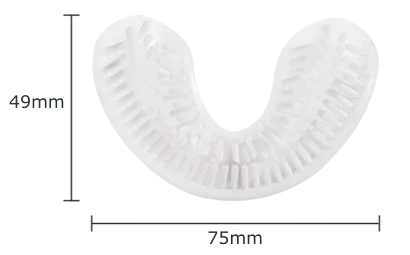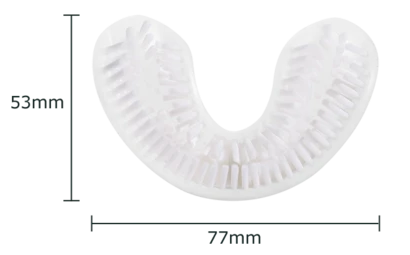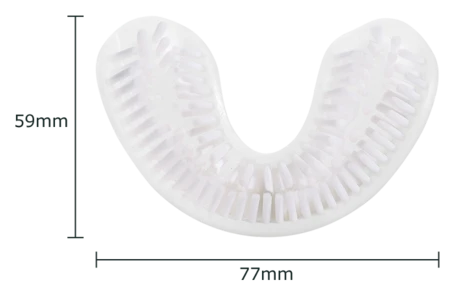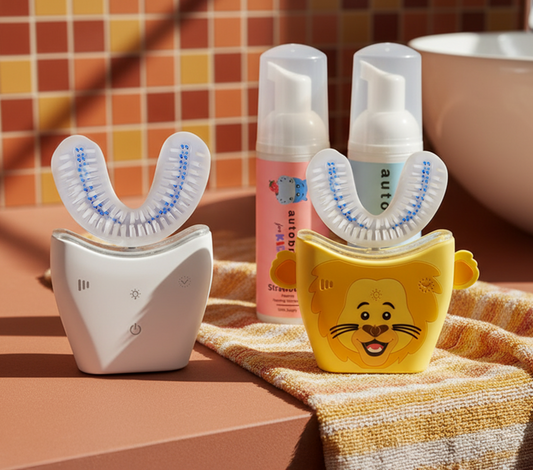
Understanding Underbites in Toddlers
As toddlers grow and develop, parents may notice certain dental issues and one common concern is underbites. An underbite occurs when the lower front teeth protrude beyond the upper front teeth when the jaws are closed. In this blog post, we will look into why toddlers get underbites, whether they can outgrow them, and how underbites can be treated. Additionally, we will emphasize the significance of early oral care in maintaining overall dental health and introduce some products that make dental care enjoyable for little ones.

Why Do Toddlers Get Underbites?
The development of underbites in toddlers can be influenced by various factors. One primary cause is genetics. If either parent has an underbite or a malocclusion, there is a higher likelihood that the child may inherit the same condition. Additionally, certain habits, such as thumb sucking or extended pacifier use, can affect jaw development and contribute to an underbite. Prolonged bottle feeding and excessive use of sippy cups can also play a role in dental misalignment.
Can Toddlers Outgrow Underbites?
In some cases, toddlers with mild underbites may outgrow the condition as they continue to develop and their jaw structure changes. However, if the underbite is severe or persistent, it is less likely to correct itself without intervention. Early detection and appropriate treatment are crucial to ensure that the underbite does not worsen with age.
Do All Toddlers Have Underbites?
No, not all toddlers have underbites. Dental conditions, including underbites, can vary from child to child. Some toddlers may develop an underbite, while others may experience different dental issues or have perfectly aligned teeth and jaws. Regular dental check-ups are essential to monitor the development of your child's teeth and catch any potential problems early on.

Treating Underbites in Toddlers:
When it comes to treating underbites in toddlers, early intervention is vital. The most effective time to address dental misalignments is during the early developmental stages. Here are some common treatment approaches:
- Orthodontic Appliances: In some cases, orthodontic appliances like expanders or braces may be used to gradually shift the teeth and jaw into proper alignment. Early orthodontic treatment can help guide jaw growth and reduce the severity of the underbite.
- Behavioral Modifications: Addressing habits that contribute to the underbite, such as thumb sucking or pacifier use, can aid in correcting the condition.
- Surgery: In severe cases where non-invasive methods are ineffective, surgery may be considered, but this is typically a last resort and is more common in older children or teenagers.
The Importance of Early Oral Care:
Instilling good oral care habits in toddlers is essential for maintaining healthy teeth and gums throughout their lives. Early brushing helps prevent cavities and sets the foundation for a lifetime of proper dental care. Introducing dental hygiene as a fun and enjoyable activity will encourage toddlers to be more receptive to brushing.
Training Toothpaste in Fun Flavors:
Using training toothpaste in delightful flavors can make brushing time more enjoyable for toddlers. The enticing taste will pique their curiosity, making brushing seem like a fun activity rather than a chore. However, it's crucial to use fluoride-free toothpaste until the child is old enough to spit it out to avoid the risk of ingesting excessive fluoride.

AutoBrush: Making Dental Care Fun for Toddlers
AutoBrush offers a range of products designed to make dental care enjoyable for toddlers and parents alike. Their teether, acting as a first-stage toothbrush, is designed to soothe sore gums while promoting oral hygiene. As the child grows, AutoBrush's manual toothbrush is perfect for training toddlers to brush independently with its child-friendly design and gentle bristles.
To Recap
Understanding underbites in toddlers, their causes, and the potential for outgrowing them is crucial for parents. Early intervention and regular dental check-ups are essential to address underbites and other dental issues. By starting dental care early, parents can ensure their children develop good oral hygiene habits that will last a lifetime. Products like AutoBrush's teether and a manual toothbrush can make dental care fun, setting toddlers on the path to a healthy and confident smile. Remember, investing in your child's oral health now will yield a lifetime of benefits.












